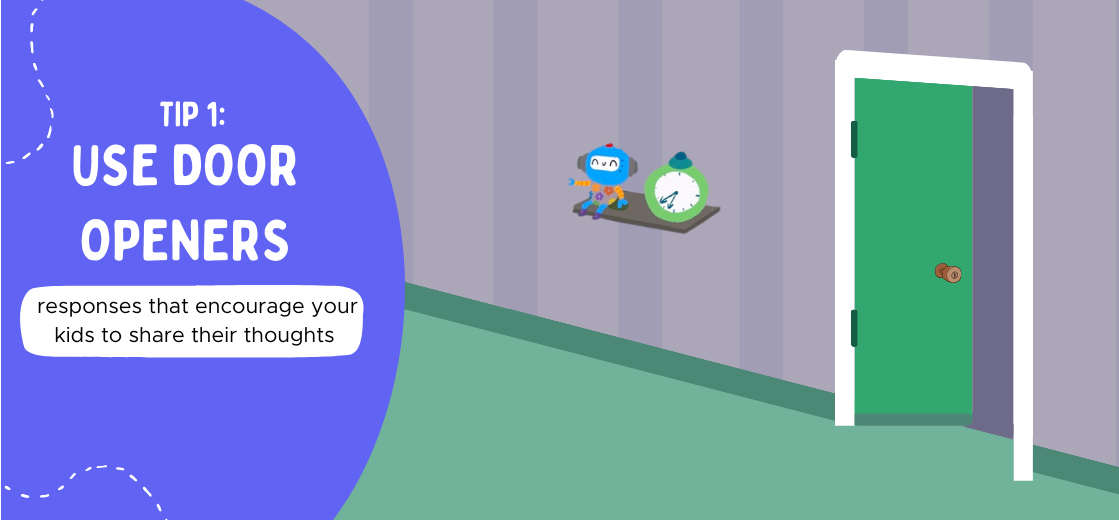
3 Tips for Effective Communication with Your School-Aged Kid
Kimberly HongMastering Communication with Your School-Aged Kid: 3 Essential Tips
Talking with your kid is a daily event. But let's face it, as parents, we are busy, and it is easier to keep the conversation with our kid light so we can move on to the next item on our "to-do" list. There's a place for light conversation in daily life, but there are also those times when your kid needs you to tune in and listen more deeply. But before you start feeling guilty and spiral down the path of self-blame, we want to reassure you that it's completely normal to struggle!
The Importance of Effective Communication

Every interaction you have with your kid is a form of communication. It's not just about the words you say: The tone of your voice, the look in your eyes, and the huge and kisses you give - all convey messages to your kids. The way you communicate with your kid not only teaches them how to communicate with others, it shapes their motional development. Your kids will intuitively sense that you understand them better because you took the time and energy to really care.
Why Kids Ignore "No" and What You Can Do About It
"No!" says your kids as they stomp their feet in a state of strong conviction, holding their ground to your request to pick up their your request to pick up their toys, brush their teeth, be gentle with the dog, or anything really. This resistance seems to stir up big emotions in parents.
Experts say that the average school-aged kid hears the word no about 400 times a day. No tends to be our quick response and we are likely unconscious of how often it slips our lips. Being told no doesn't feel good, and in fact, it can be downright infuriating when such a big, dug-in no comes from such a tiny package. But again, our kids are often reflections of us, mirroring our mannerisms and words.
Alternatives to Saying "No" to Your Kids

If your kid regularly ignores you when you tell them "no", then are you saying it too frequently. Your kid may have heard the word so often that they've learned to tune it out. The problem with this is that they are too young to judge when listening to "no" is important, such as when they're about to do something unsafe.
As a parent, it's impossible to stop yourself from saying "no" sometimes, but life will be easier for both of you if you can find other ways to guide your kid. Luckily, there are plenty of ways to avoid saying an outright "no".
Fun Fact: All Creatures Communicate!



Top 3 Tips for Effective Communication with Your School-Aged Kid
Parenting is difficult enough, but learning how to communicate with your little one is the key to crafting an everlasting relationship with your little one while setting them up for a lifetime of success. Our experts here at MEandMine have created a cheat sheet containing three not-so-secret tips to help you get on to becoming communication experts yourself.
Tip 1: Use Door-Openers

We all know what it's like to talk to someone who seems disinterested in your conversation. Though they are responding to your every sentence, everything about their body language tells you otherwise. These subtle unconscious cues that we exhibit can easily be misinterpreted by our little ones, discouraging them from wanting to pursue further conversations with you. To prevent misunderstandings and facilitate better conversations with your kiddos, try including door openers with your responses to encourage your kids to share their thoughts while reassuring them that you're engaged in the conversation.
Practice Using Door Openers:
- "Wow"
- "I see"
- "How about that"
- "Really? How so?"
- "Tell me more"
- "Oh, that's so interesting, tell me more!"
- "How so?"
Tip 2: Practice Active Listening

"Often parents communicate most effectively with their children by the way they listen to and address each other. Their conversations showing gentleness and love are heard by our ever-alert, impressionable children." - Marvin J. Ashton
Believe it or not, kids are a lot smarter than you think. When you're giving them half of your attention, trust us, they know, and they can tell. Research shows that 62% of kids say that their parents are distracted when they are talking to their parents. As busy parents who struggle to juggle the craziness that comes with parenting but also manage to keep up with our busy lives, we often struggle to find quality time to catch up and talk to our little ones. I know what you're thinking. I spend quality time with my kid all the time. There's not a moment when we're not talking! But no, I don't mean those talk during the car rides after picking them up from daycare or the ones that occur while you're in the middle of responding to a quick text message or email on your phone. Though it is impossible to demand giving your little ones your full attention 24/7, make sure you constantly set aside time during your busy day to have a genuine conversation with kiddos, no distractions allowed!
Next time you kiddo comes up to you demanding your immediate attention and response, try giving them your full attention by giving them eye contact and putting a pause on what you are currently up to. In moments where you can't stop and give them your immediate attention, make sure you tell them and even try giving them an estimate on how long they'll have to wait. When you're unable to give them your full attention, try something like: "I'm so sorry, I'm little bit busy right now. Can you hold that thought for 2 minutes so I can finish up and give you my full attention?"
Try it out for yourself:
When your kids are talking to you:
- Give them eye contact
- Stop what you're doing
- Shift your body so that you are facing them
- Respond appropriately
- Even try kneeling down and getting on their eye level to help them understand that you both are on the same level on the same team
Tip 3: Validate Feelings

Nothing hurts more when you feel like your feelings are invalid and downplayed. As a parent, your little ones will naturally come to you when they feel sad, hurt, and so forth. The best you can do is create a safe space for your little ones to voice their thoughts and feelings without feeling judged. Though sometimes what they feel might seem silly, be sure you don't downplay their feelings. Their problems are as real as yours and should be taken seriously.
Every feeling is valid, but not every behavior is. Understandably, there are times when you might disagree with the resulting behavior that occurs due to their feelings and naturally want to correct them instantly. Remember that every feeling is valid, but not every behavior. Make sure you correct their behaviors without downplaying their feelings. Reassure them that you can see why they are feeling that way, but also try helping them find new and appropriate ways to handle difficult situations.
Communication Games for Kids: Test Your Skills

Congratulations, you are now on your way to becoming experts at communicating with your little ones! Practice integrating each of these tips into your daily life and see how it takes your communication to the next level. Put your communication skills to the test and practice integrating these skills through a fun and engaging family game. Our experts here at MEandMine put together a fun but challenging family game that's guaranteed to create a memorable family bonding experience while strengthening your ability to communicate with each other.
With the proper communication skills, your family will be equipped with the ability to succeed and create lifelong bonds that can withstand any challenges life throws at you.
Learn more about the research
UNICEF. (2022). How to communicate effectively with your young child. www.unicef.org. https://www.unicef.org/parenting/child-care/9-tips-for-better-communication
8 psychologist-backed tips for improving communication with kids. (2018, January 22). Www.mother.ly. https://www.mother.ly/life/8-expert-tips-talk-effectively-kids/-talk-effectively-kids/
Gilles, G. (2015). 7 Tips for Effective Communication with Your School-aged Child - Child Development and Parenting: Middle Childhood. Mentalhelp.net. https://www.mentalhelp.net/blogs/7-tips-for-effective-communication-with-your-school-aged-child/
Communicating Effectively With Children. (n.d.). Extension.missouri.edu. Retrieved January 20, 2023, from https://extension.missouri.edu/gh6123#Communicating





 Most Popular
Most Popular
